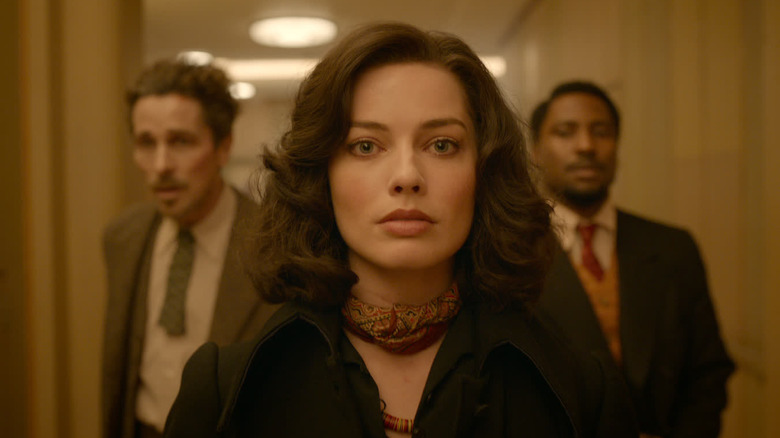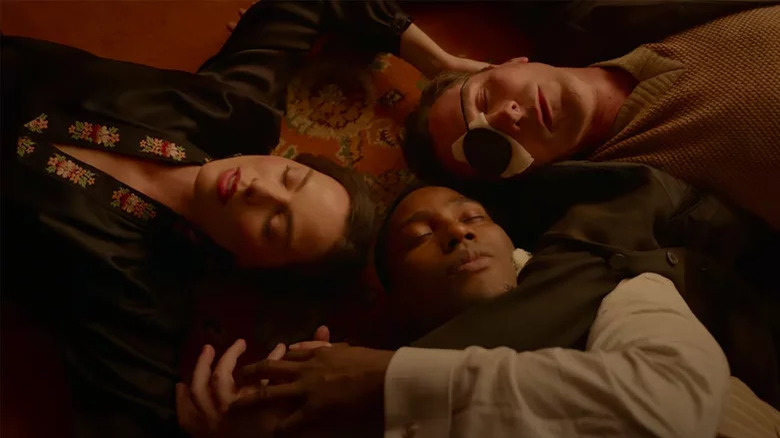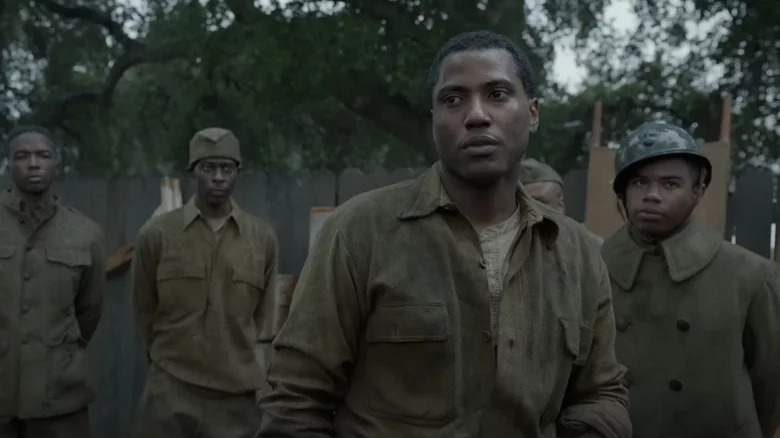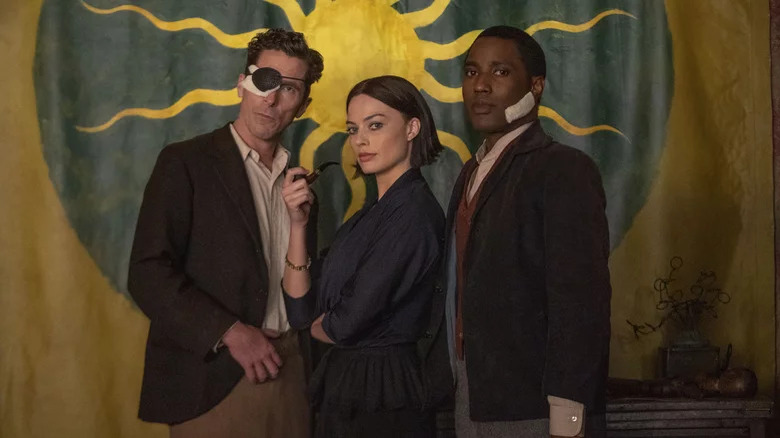Amsterdam Review: Enjoyable Performances Can't Save David O. Russell's Undercooked Movie
At face value, it sure seems like David O. Russell's new film "Amsterdam" must be swinging for the rhetorical fences. The film boasts an A-list cast, lead by three very bankable stars in Christian Bale, John David Washington, and Margot Robbie. It's lensed by repeat Oscar winner Emmanuel "Chivo" Lubezki, a true talent. Developing the narrative took years of work and collaboration. On paper, the movie has everything it needs to succeed and more, or at least it should.
The story itself is loosely based on a real-life 1933 conspiracy known as "The Business Plot," where a set of wealthy clandestine businessmen sought to overthrow President Franklin D. Roosevelt to install an unelected regime of fascist-aligned veterans. The conspirators sought to enlist retired Marine Corps Major General Smedley Butler, but he had other plans. The effort was thwarted. That narrative forms the loose background of this heavily fictionalized film, where a trio of outsiders get at the heart of a deadly fascist conspiracy and help stop it in its tracks.
"Amsterdam" indeed has a number of charming scenes, a stunningly top-tier cast, and flawless cinematography. At the same time, it also fails to balance its wildly fluctuating tones, it rests its central narrative on plot contrivances, and the sum total of these shortcomings impedes the ability of its excellent performers to land the film. As a whole, "Amsterdam" is a movie that finds itself decidedly less than the sum of its parts.
Tonal chaos in Amsterdam
At its core, "Amsterdam" is a tale of both friendship and conspiracy. The story begins with a pair of long-time war buddies, Dr. Burt Berendsen (Christian Bale) and his friend Harold Woodman, Esq. (John David Washington). The pair are asked to examine the body of their old general, Bill Mankins (Ed Begley Jr.), recently deceased by reportedly natural causes. They discover foul play before being framed for a crime they didn't commit, and they're forced to go on the run. Along with their unconventional wartime-savior-turned-companion Valerie Voze (Margot Robbie), the trio become roped into a criminal conspiracy that threatens the very fabric of the United States' power structure.
A lot happens on the way to thwarting a fascist conspiracy. Audiences get a window into Burt and Harold's wartime difficulties, and they see their happy-go-lucky era with Valerie in Amsterdam before the quiet tragedy of the trio gradually going their own ways. The trio reunite after the gents are framed, and they become centerpieces in a plan to trap the heads of the aforementioned criminal conspiracy. If this sounds like a lot, it truly is. On the one hand, the film boasts many enjoyable moments. With such a talented trio, how could it not? On the other, some of the movie's most central plot threads feel woefully contrived. Burt and Harold happen to find themselves connecting with someone who, of all people and unbeknownst to them, is personally tied to the conspiracy that haunts them years later? Of all possible people? These coincidences are nigh unbelievable, while the disparate plot threads also have a very difficult time congealing into anything resembling a coherent whole.
"Amsterdam" boasts scenes that feel like the audience is transported into the beginnings of a historical war epic. It has others that feel like a conspiratorial spy drama. Others still feel like odd slapstick (how many times does Burt's glass eye fall out?), while different scenes have a quirky comedic tone reminiscent of a brown-hued Wes Anderson outing without the architectural symmetry. It often feels like someone shuffled together script pages from three to four wildly different takes on the material, making for a confused, tonally dissonant project. The film has a hard time landing any particular one of these tones because none of them are committed to, muting the impact of its otherwise timely subject matter.
Solid but undermined performances
The performances, as to be expected, are largely excellent. Christian Bale's turn as Burt is appropriately odd, complex, and often funny. He spent a lot of time getting into the headspace of his character, and it shows. Robbie's Valerie is a similar delight, with unsettling eccentricities and charming enthusiasm allowing her to easily steal many of the scenes she's in. John David Washington's Harold has the unfortunate distinction of being the straight man in a tale full of oddities, but he gives an admirable performance despite the relative lack of memorable material. Also worth noting are Mike Myers and Michael Shannon's frequently paired set of intelligence operators — their limited scenes are routinely among the film's best and most successfully landed. With such a large cast, however, many other players (notably including Robert De Niro, Anya Taylor-Joy, Andrea Riseborough, and Rami Malek) give decidedly solid performances but are brutally underutilized.
It's decidedly difficult for even such a talented cast of performers as this to salvage a narrative that can't decide the kind of film it's trying to be. If you don't know the target, how can your performance hit it? While the performers are adept and seasoned, without a bad actor among them, the impact of their talents is muted in a film whose tone fluctuates so wildly that it muddies nearly every aspect of the project. For example, there are serious scenes where the villains are doing dastardly deeds with massive consequences before something happens and Bale's Burt trips and loses an eye, while we watch it shatter or roll away to other characters' dismay. Margot Robbie's Valerie is similarly given ailments that reduce the fiery protagonist to a somewhat comedic liability in moments that otherwise have deep emotional stakes.
These sorts of moments are exemplary of the larger problem in "Amsterdam," which is that no technical or performative prowess can save a film without a clear vision behind it. The talented cast can certainly land what they're trying to do in individual scenes, but what they're asked to do is sometimes inconsistent with their character or with the tone the scene was already building. Great though they may be, they couldn't salvage an undercooked project.
The consequences of a troubled history
Beyond the aforementioned issues, "Amsterdam" also has to face a very large elephant in a regrettably small room. While David O. Russell's work has often received a strong critical reception, the filmmaker nonetheless has a troubling legacy of behavior both on-and-off set. It's tempting to argue that an artist's behaviors shouldn't impact the perception of their work, mainly because it's a convenient and easy argument to make. At the same time, accountability genuinely matters. Refusing to acknowledge dangerously inappropriate tendencies enables them. As a film critic, ignoring these elements involves a willful blindness, but shouldn't such criticism involve a commitment to tell a critic's "truth" about how they see a project and its limitations?
Russell's reported history of aggressive and inappropriate behaviors has a long and well-chronicled history (see here). The New York Times reports accounts of Russell's fistfights with George Clooney and Christopher Nolan. There is a long history of witnesses corroborating claims of abusive on-set outbursts against actors like comedy legend Lily Tomlin (caught on video), Jennifer Lawrence, and Amy Adams. The most troubling account comes in early 2012, when the director's transgender niece Nicole Peloquin filed a police report that Russell sexually assaulted her at a Florida gym on December 30, 2011. Russell even admitted to groping Peloquin to the Broward County Sheriff's Office but denied wrongdoing, and no charges were filed.
Witnesses and recorded admissions aside, Russell has never been truly held accountable for these reported actions. It's a trend that's emblematic of the darker tendencies of Hollywood history, and to not highlight it is to reinforce that exact culture of silence. For "Amsterdam," however, it also creates a particularly troubling irony at the film's very heart. At its core, "Amsterdam" centers a diverse trio of outcasted protagonists who thwart a plan by powerful, unaccountable men to install an unaccountable fascist government in the U.S. As a critic I'm inclined to love any film that shows the downfalls of fascists against a band of plucky outsiders, but it's hard to ignore the deep irony of a movie that criticizes attempts to lord dangerous unaccountable power yet is directed by a filmmaker with a reputation for unaccountable abuses himself. It's an irony that undercuts the film's most important element: its message. In conjunction with the film's other issues, "Amsterdam" falters.
/Film Rating: 4 out of 10



